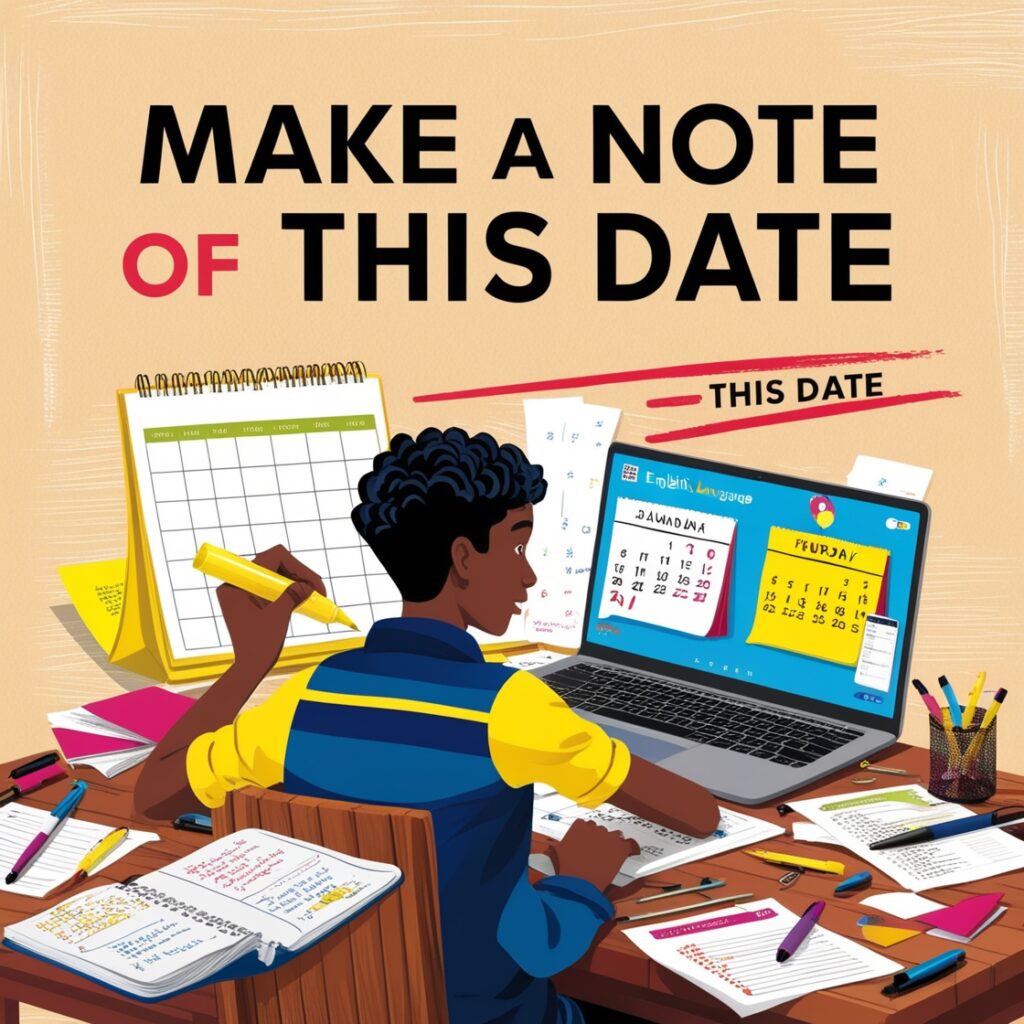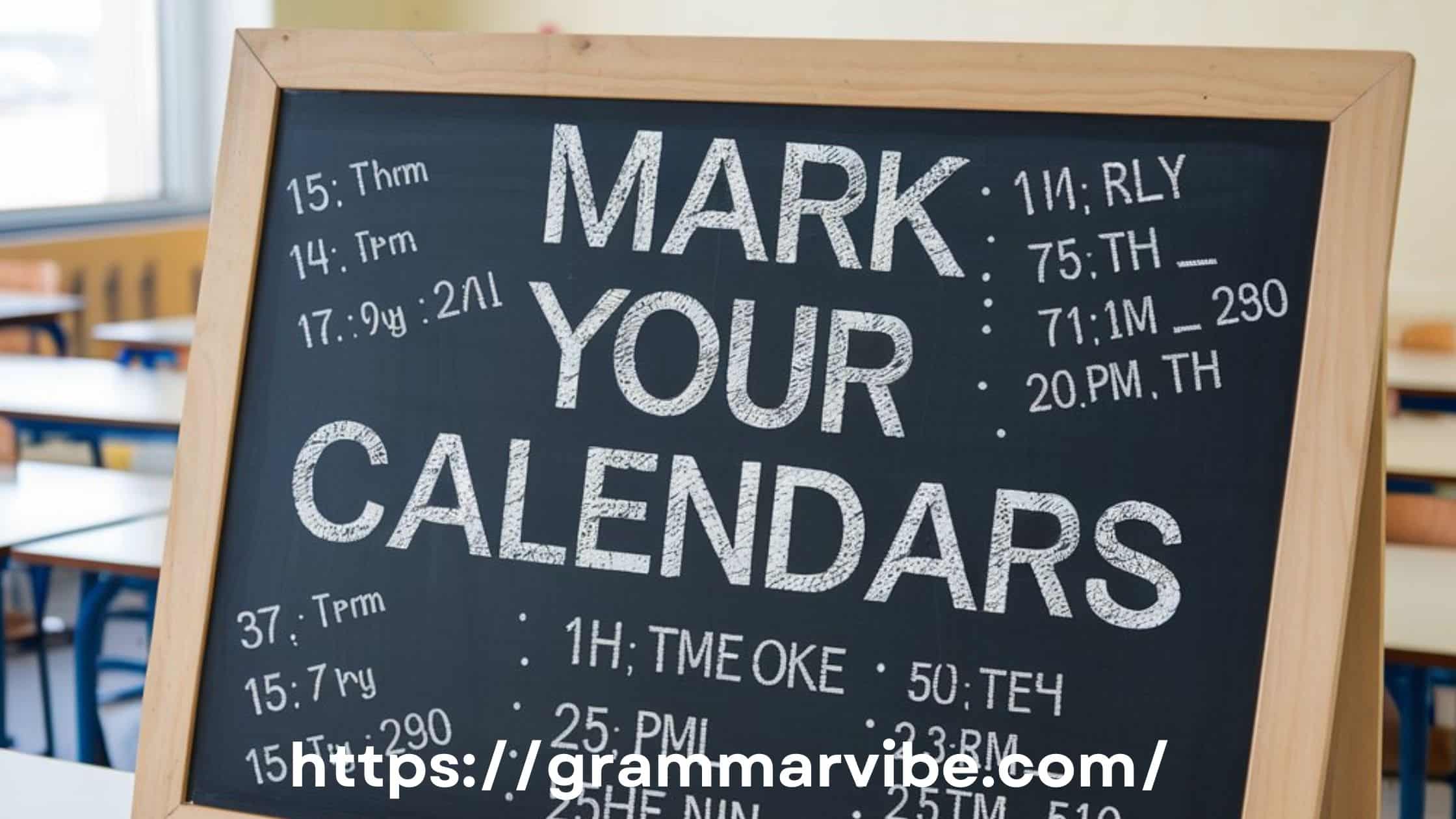If you’re looking for a fresh approach to remind people about important dates and events, it’s time to expand your vocabulary beyond the classic “mark your calendars.” While this phrase gets the job done, using varied expressions can make your communication more engaging, professional, or even fun—depending on the context.
In this article, we’ll dive into creative ways to say “mark your calendars,” tailored for various situations and audiences. Each suggestion comes with practical examples you can seamlessly integrate into your emails, messages, or casual conversations, helping you spread positivity and motivation as the week kicks off.
Why Use Alternatives to “Mark Your Calendars”?
Variety is key in keeping communication lively and engaging. Constantly using the same phrases can make your language feel repetitive. Different alternatives not only bring freshness but also allow you to match the tone and urgency of the situation. Whether you’re sending out formal invites for important meetings or planning a casual family gathering, having the right expression can make all the difference.
Here’s a breakdown of alternative ways to say “mark your calendars,” along with specific scenarios for both formal and informal settings.
1. Save the Date (Formal)
Save the date is commonly used for significant future events, particularly in formal settings such as weddings, conferences, or important corporate events. It conveys a tone of seriousness, urging the recipient to lock in the date well in advance.
Scenario Example:
Email:
Subject: Save the Date – Annual Company Gala
Dear Team,
Please save the date for our upcoming Annual Company Gala on December 10th. More details will follow, but we hope to see everyone there!
2. Circle the Date (Casual)
For a more relaxed and friendly approach, circle the date works well in informal settings. It has a casual tone, often used between friends or colleagues, implying that the event is noteworthy, but not formal.
Scenario Example:
Text message:
Hey Sam, don’t forget to circle the date for March 15th. We’re organizing a little get-together for John’s birthday!
3. Note the Date (Neutral)

Note the date is versatile and works in both professional and personal settings. This phrase carries a neutral tone, perfect when you simply want to remind someone to remember an upcoming event without sounding too directive.
Scenario Example:
Email:
Subject: Note the Date – Project Review Meeting
Hi Team,
Please note the date for our next project review meeting on November 5th. We’ll be discussing our quarterly targets and progress.
You might also like: Other Ways to Say “See You Then”
4. Block off This Day (Directive)
In more formal and professional settings, when you need people to make the day completely free from other commitments, block off this day is the way to go. This directive phrase implies a level of urgency and importance.
Scenario Example:
Email:
Subject: Block Off This Day – Critical Strategy Session
Dear Colleagues,
Please block off this day for our critical strategy session on January 14th. We’ll be making important decisions regarding next year’s business strategies.
5. Keep the Day Open (Suggestive)
Keep the day open is a more suggestive phrase, usually implying that plans are still being finalized, but the recipient should remain available. It’s perfect for situations where the event’s exact timing is uncertain.
Scenario Example:
Phone call:
Hi Sarah, can you keep the day open on July 20th? We’re planning a family reunion, and I’ll send out more details soon.
6. Highlight This Date (Emphatic Request)
When you need to emphasize the importance of an event, highlight this date adds extra weight to the reminder. It’s particularly useful when you want the recipient to make sure the date stands out on their calendar.
Scenario Example:
Email:
Subject: Highlight This Date – Community Cleanup Event
Dear Volunteers,
Please highlight this date: September 18th is our annual community cleanup. We look forward to having as many volunteers as possible for this important cause!
For your interest: Other Ways to Say “Have a Safe Trip”
7. Put This on Your Agenda (Professional)
For a professional touch, especially in workplace settings, put this on your agenda works well. It’s often used in emails or meetings where you’re referring to specific tasks or events that need to be attended or discussed.
Scenario Example:
Email:
Subject: Put This on Your Agenda – Compliance Audit Review
Dear Department Heads,
Please put this on your agenda: We’ll be holding a compliance audit review meeting on October 2nd to discuss our preparation strategy.
8. Reserve This Date (Formal)
Similar to “save the date,” reserve this date is a formal phrase that implies exclusivity—asking the recipient to keep the day free for a particular event. It’s often used in official invitations.
Scenario Example:
Invitation:
Dear Board Members, Please reserve this date for our upcoming executive board meeting on April 28th. Your attendance is crucial.
9. Pencil This In (Tentative Suggestion)
Pencil this in is great when you want to suggest adding an event to someone’s calendar, but acknowledge that the details might still change. It carries a light, informal tone, perfect for tentative plans.
Scenario Example:
Text message:
Hey Alex, can you pencil this in for next Friday? We’re thinking of having a barbecue but might tweak the time depending on everyone’s schedule.
Check out this: Other Ways to Say “Welcome Home”
10. Don’t Forget This Date (Reminder)
For a straightforward reminder, don’t forget this date works well. It’s neither too formal nor too casual, making it flexible for various contexts, especially when you want to reinforce the importance of remembering the date.
Scenario Example:
Email:
Subject: Don’t Forget This Date – Submission Deadline
Dear Team,
Just a quick reminder: don’t forget this date: the submission deadline for our annual report is December 1st.
11. Lock in the Date (Informal)
When making plans with friends or family, lock in the date brings a sense of certainty and commitment to the plans without being overly formal. It implies that once confirmed, the date shouldn’t be missed.
Scenario Example:
Text message:
Hey Mike, let’s lock in the date for our hiking trip on August 9th. It’s going to be awesome!
12. Set Aside This Day (Suggestive)
Set aside this day is a more polite and gentle suggestion, often used for non-urgent, but still important, personal or professional events. It implies that the event deserves some time and consideration.
Scenario Example:
Email:
Subject: Set Aside This Day – Department Picnic
Dear Team,
Please set aside this day: July 4th for our annual department picnic. We hope to see everyone there for a fun day out!
13. Make a Note of This Date (Neutral)

When you want to keep it simple and neutral, make a note of this date works well. It’s a polite request to remember the day without adding any urgency or formality to it.
Scenario Example:
Email:
Subject: Make a Note of This Date – Project Kick-Off
Hi Team,
Please make a note of this date: Our project kick-off meeting will be held on May 17th at 2:00 PM. Looking forward to starting this new venture!
14. Plan for This Day (Directive)
When you need people to make arrangements for a specific day, plan for this day is a directive phrase that asks the recipient to actively prepare or consider the event in their plans.
Scenario Example:
Email:
Subject: Plan for This Day – Product Launch Event
Dear Marketing Team,
Please plan for this day: Our product launch event will take place on September 22nd, and we’ll need all hands on deck for a successful launch.
More for you: Other Ways to Say “I Hope Everything Is Going Well with You”
15. Be Sure to Remember This Date (Reminder)
A slightly more casual and friendly variation of “don’t forget this date,” be sure to remember this date works well when you want to remind people in a lighthearted, yet clear, manner.
Scenario Example:
Text message:
Hey James, be sure to remember this date: We’ve got the annual neighborhood cookout on June 10th! See you there!
synonyms for “Mark Your Calendars”
| Synonym | Tone | Scenario |
|---|---|---|
| Save the Date | Formal | Weddings, major events, corporate events |
| Circle the Date | Casual | Friend’s birthday, informal gatherings |
| Note the Date | Neutral | Team meetings, project reviews |
| Block Off This Day | Directive | Critical strategy sessions, important meetings |
| Keep the Day Open | Suggestive | Family reunions, tentative plans |
| Highlight This Date | Emphatic Request | Volunteer events, significant dates |
| Put This on Your Agenda | Professional | Compliance audits, workplace meetings |
| Reserve This Date | Formal | Executive meetings, formal invitations |
| Pencil This In | Tentative Suggestion | Informal gatherings, tentative plans |
| Don’t Forget This Date | Reminder | Submission deadlines, simple reminders |
| Lock in the Date | Informal | Plans with friends, casual commitments |
| Set Aside This Day | Suggestive | Department picnics, non-urgent events |
| Make a Note of This Date | Neutral | Kick-off meetings, simple announcements |
| Plan for This Day | Directive | Product launches, strategic events |
| Be Sure to Remember This Date | Friendly Reminder | Neighborhood events, casual reminders |

Kyren Paul is an experienced blogger and the creative mind behind “Grammar Vibe.” With a passion for the nuances of English grammar, he brings clarity and insight to everyday language topics, making grammar accessible and engaging for readers of all levels.











Leave a Comment